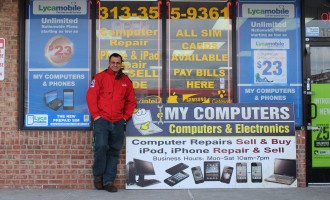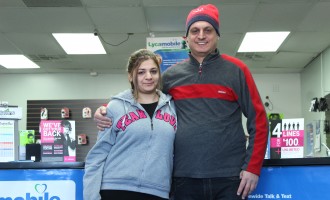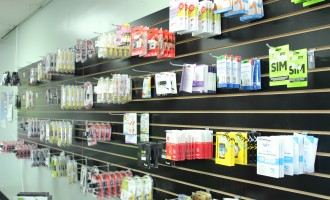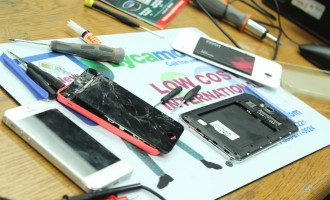An investment in independence
Published on February 18, 2015 in Finances
When Imad escaped war-torn Iraq and came to the U.S. as a refugee, everything changed. But with the help of a MicroGrant from United Way, Imad was able to purchase the inventory to start his own business and give his family a better future.
Video by Charles Ashley. Story by Valerie West.
Drop your smartphone and crack the screen? That’s no problem for Imad Agh Morad, store owner of My Computer and Phone on Warren Avenue in Detroit. On this frigid day, Imad is outfitted in a patriotic red, white and blue ensemble, topped off with a ski cap emblazoned with “USA” beneath Olympic rings.
Imad was one of several Greater Detroit residents who was a recipient of a United Way for Southeastern MicroGrant, which helped fund his burgeoning business. But six years ago, Imad never imagined that he would be living in the States, let alone running a business — he was just trying to survive.
A war-torn country
In 2009, Imad was living in Iraq. A husband and father of three, he supported his family as an electrical engineer. Everything changed when he was kidnapped by an Iraqi militia organization that accused him of spying.
“I thought I would never see tomorrow,” he said. For seven months, Imad was tortured in darkness. He pointed to his mouth, showing a dental bridge that fills in his missing teeth.
He closed his eyes and pauses, “I’m sorry, I don’t want to remember.”

Imad is the store owner of My Computer and Phone on Warren Avenue in Detroit.
During his torment, Imad’s greatest fear was for his family’s safety, “If they did this to me, they could do it to them.”
When he was finally released, he immediately started searching for his wife and children. He learned from his brother that his family had searched for him and finally fled to Istanbul.
Fearing that he could be found and tortured again, he called his friend, a fellow engineer who lived in Sweden. They met in Istanbul where Imad learned that his family had sought refugee status with the United Nations and immigrated to the United States. Without the proper paperwork, Imad could not immediately join his family.
His friend helped him gain a work permit to join him in Sweden, and for the next three years, he assimilated into his new life, acquiring several new languages and working again as an engineer. He sent his earnings to his family, which had relocated to Fort Collins, Colorado.
Joining his family
When Imad was granted permission to enter the States, he was anxious. On the plane ride to Denver, he worried that his children wouldn’t remember him.
“I missed everything in three years. I wasn’t there for birthdays. Everything has changed. This was a hard time for me.”

Imad’s daughter Riyam, who helps him tend to the store, is his pride.
As Imad recalled this period of his life, his daughter, Riyam who had been tending the store with him, looked up from her homework and listened intently. Imad said Riyam is his pride. She’s a freshman at Henry Ford Community College, pursuing a degree in biomedical engineering. After their reunion in Denver, he continued, his greatest joy was walking his children to and from the bus stop.
But life in Colorado proved challenging. There wasn’t an Arab-American population that could help the family transition. Even a seemingly simple task like buying groceries turned into a two-hour commute to Denver, which was the nearest location of a Halal grocer that met the family’s religious dietary needs. Perhaps his greatest obstacle, Imad was told he would need two years of training in the States in order to be recognized as an electrical engineer and find work in his field.
“This is hard because, you know, in America you have bills. And if you have a big family like me, three children and a wife, you don’t have time to study.”
After a few months in Colorado, with little work options, he decided to leave his family and search for jobs in Michigan, which has the second highest Arab American population in the nation.
Welcome to the Mitten
Imad was sitting in a coffee shop where he learned that a nearby store owner wanted to sell his computer repair shop. Seeing an opportunity, he asked for the address and walked three miles to meet the owner and offer his services — for free.
“I wanted to learn everything before I decided to take the store.”
He worked as an apprentice for four months without pay. During this time, he sought community resources and reached out to ACCESS, a United Way for Southeastern Michigan partner that offers assistance in eight neighborhoods with a focus on helping Arab-American immigrants and refugees adjusting to life in the States.

Imad was awarded a MicroGrant from United Way to buy the tools and stock to start his business.
Here, he took business classes and received financial coaching based on a model United Way helped develop. He also secured a loan from Southwest Solutions, another United Way partner, to purchase the business. Despite these gains, Imad still lacked the necessary funds to buy the tools and stock to start his business.
After submitting his story and business plans, Imad was awarded a MicroGrant from United Way for Southeastern Michigan. United Way started the MicroGrant initiative in 2011. Nearly 100 recipients have since been awarded a grant, which can range from a few hundred dollars to a little over a thousand, and can be used for several purpose — from a new business venture to education advancement to licensing fees. Applicants must meet certain criteria and can only apply if they have received financial coaching. It’s just one tool United Way is using, with the help of community partners like ACCESS, to help families reach a level of independence.
Imad was able to send for his family and said he is grateful for the grant because it has given the family a better future.
Investing in community
Karen Tyler-Ruiz, the Senior Director of Community Impact in Financial Stability at United Way, said she’s continually touched by stories like Imad’s. “At United Way, our vision is to make Greater Detroit one of the Top 5 places to live and work, and a key part of that is making sure that our families are financially stable.”
United Way offers a unique value because it views people’s needs holistically, she said, by looking at all of a person’s challenges, rather than serving a singular need. If someone needs shelter, for instance, the next question may be to find out if that person needs a job or has transportation barriers.
“The value we bring at United Way is to think about all the components of a person’s financial life and bring that together.”

Imad’s business is growing, and he hopes to buy a second store.
United Way uses this approach in all areas of its work and seeks partners who can help scale these integrated models to better serve the community.
Amne Darwish-Talab, co-director of the Social Services Department at ACCESS said United Way and ACCESS share the same vision for the community.
“We (United Way and ACCESS) are always putting our heads together to figure out what can we do next to make these clients more self-sufficient,” she said, asking, “What kind of programs can we develop to move these clients out of poverty and into a better quality of life? It’s been a long relationship and a great relationship.”
Karen noted that opportunities for job and entrepreneurship training, financial coaching, and income support can increase a family’s chances for long-term stability. And when families are stable, communities benefit.
“The people we see are hardworking,” said Karen. “They have to make a commitment to work with a financial coach over time, sometimes from six months to a year. I’m proud to be a part of this work and getting it started.
Making it in America
Back in the store, Imad shows off his technical prowess and asks his daughter to bring him his eyeglasses. She playfully asks for a $20 finder fee.
He laughs, recalling an earlier conversation, “She says, ‘Pop, I need a new laptop, can you buy this?’ She’s now 20!” But there seems to be little doubt that the two will be shopping for some new equipment together in the near future.
Whenever he has to leave to visit the bookkeeper or warehouse, his children watch over the store and his wife comes in to clean. It’s a family operation from 10 a.m. to 8 p.m.
Now Imad’s business is growing and he hopes to buy a second store. He recently put a down payment on a house and the family has two cars.
With a new life comes new traditions, including Family Nights on Friday, which usually includes dinner at a favorite seafood restaurant followed by a movie.
“You work hard five days, you need some fun.”
Imad is proud of his new life, even though he misses his home country.
“I will never go back,” he said. “But I miss everything. My mom. My brothers. My friends. My neighbors. I miss my life. When I see the news, see what happened to my country — it’s terrible. But I say thank God I can leave my country and start a new life here. I feel like I am an American man, not a refugee.”
Editor’s Note: Marina Csomor contributed to the interview of this story.